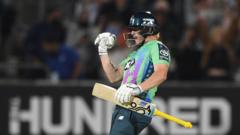How is Slurry Spreading Transforming Ireland’s World Cup Success?

The journey of the Ireland women's rugby team back to the World Cup has been marked by resilience and transformation, reflecting a renewed commitment from players and the governing body. Dubbed 'the green wave', this movement signifies a united front as the team seeks to reclaim its place among the elite in women's rugby. The squad is driven not only by a desire for victory but also by a broader mission to inspire future generations of female rugby players.
Last updated: 24 August 2023 (BST)
Key Takeaways
- The Ireland women's rugby team has experienced significant improvements since missing out on the last World Cup.
- New coaching staff and structures have been implemented to enhance player performance and welfare.
- The term 'green wave' reflects the growing support for women's rugby in Ireland.
- Players are now better prepared for international competition, having come through structured development pathways.
- Despite challenges, the team aims to inspire future generations of girls in rugby.
The Road to Redemption
After enduring a disappointing exit from the 2021 World Cup qualification, where they failed to secure wins against Scotland and Spain, the Ireland women's rugby team found itself searching for a new identity. This was a low point for a team that once reached the semi-finals in 2014, and the subsequent years saw a series of struggles that cast doubt on their future.
The journey back to the World Cup has not been easy. The players faced a significant lack of support from their governing body, the Irish Rugby Football Union (IRFU). Many felt that the women’s XVs team was overshadowed by the sevens side, a sentiment that was echoed in the media and by players themselves. This disconnect culminated in a letter to the Irish government from current and former players, expressing a total loss of trust in the IRFU.
Significant Changes in Leadership and Structure
The appointment of Scott Bemand as head coach in July 2023 marked the start of a new chapter for the team. Tasked with revitalising a squad that had been whitewashed in the Six Nations, Bemand implemented critical changes that brought immediate improvements. Under his guidance, the team finished third in the championship, earning promotion into the top tier of the WXV, where they notably defeated the reigning world champions, New Zealand.
Flanker Claire Boles acknowledged the positive impact of Bemand and the coaching staff, stating that they value players both as individuals and athletes. This cultural shift has fostered a supportive environment, allowing players to focus on performance without the distractions that plagued previous years.
Building a Sustainable Future for Women’s Rugby
One of the most significant developments in the wake of the team’s struggles has been the introduction of professional contracts for XVs players. Ireland was the last of the Six Nations teams to implement this crucial step, reflecting a commitment to elevating women's rugby in the country. Additionally, the establishment of a women's national talent squad (WNTS) aims to identify and nurture emerging talent, ensuring that younger players are prepared for the demands of international rugby.
Players like Aoife Dalton and Dannah O’Brien, who were part of the WNTS, are poised to play key roles in the World Cup. Their experiences have equipped them with the skills and confidence needed to compete at the highest level.
The Current Squad and Performance Insights
As the team prepares for the World Cup, they face a challenging pool stage, including matches against Japan and Spain, followed by a formidable encounter with New Zealand. Despite recent injuries to key players like Erin King and Dorothy Wall, the squad remains optimistic about their chances. They have learned to navigate adversity and are eager to showcase their growth on the world stage.
Ireland's recent warm-up matches have provided valuable experience, with a notable victory against Scotland and a close contest against Canada. These games have enhanced team cohesion and performance, setting the stage for their World Cup campaign.
Community Support and the Green Wave
The term 'green wave' has come to symbolise the growing support for women's rugby across Ireland. The players are not only competing for victory but also working to inspire the next generation of female athletes. Boles articulated this vision, stating that the goal is to cultivate interest in women's rugby beyond the tournament, encouraging more girls to don the green jersey.
This broader mission resonates with fans and supporters, as evidenced by the increasing attendance at women’s rugby matches and the heightened media coverage of the team. The players are aware of their role in shaping the future of the sport and are committed to leaving a lasting legacy.
Conclusion: More Than Just a Tournament
As Ireland embarks on this World Cup journey, the success of the tournament will be measured by more than just wins and losses. The players are aware of the importance of their performance in the context of the broader fight for recognition and support for women’s rugby in Ireland. With the backing of fans and the IRFU, they hope to continue building on the foundations laid in recent years, ensuring that the 'green wave' becomes a lasting movement in women's sport.
What lies ahead for the Ireland women's rugby team is not just a quest for glory but also a chance to inspire and uplift future generations. The narrative of their journey is one of resilience, growth, and hope, and it promises to capture the hearts of many for years to come. #GreenWave #WomensRugby #IrelandRugby
FAQs
What is the 'green wave' in Irish women's rugby?
The 'green wave' refers to the growing support and enthusiasm for the Ireland women's rugby team, symbolising unity and a renewed commitment to the sport following years of struggle.
Who is the head coach of the Ireland women's rugby team?
Scott Bemand is the head coach of the Ireland women's rugby team, having been appointed in July 2023 to drive the team’s improvement and performance in the upcoming World Cup.
What were some key changes implemented in Irish women's rugby?
Key changes include the introduction of professional contracts for XVs players, the establishment of a women's national talent squad, and the appointment of a new coaching staff focused on performance and player welfare.
How did Ireland perform in their warm-up matches before the World Cup?
Ireland had mixed results in their warm-up matches, securing a victory against Scotland but losing to Canada. These matches provided valuable experience as they prepared for the World Cup.
What is the significance of the Ireland women's rugby team in the context of sports in Ireland?
The Ireland women's rugby team represents a significant step forward for women's sports in Ireland, aiming to inspire future generations of female athletes and promote greater visibility and support for women's rugby.
Published: 2025-08-21 19:08:10 | Category: sport



